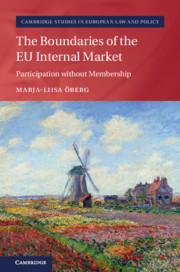2 results
3 - Internal Market Acquis
- from Part I - Expanding the Internal Market: The Concept
-
- Book:
- The Boundaries of the EU Internal Market
- Published online:
- 02 November 2020
- Print publication:
- 05 November 2020, pp 41-90
-
- Chapter
- Export citation

The Boundaries of the EU Internal Market
- Participation without Membership
-
- Published online:
- 02 November 2020
- Print publication:
- 05 November 2020

